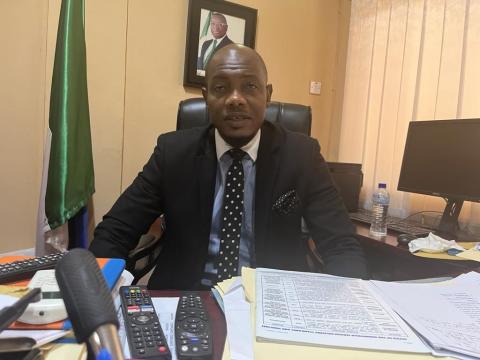By Mabinty M. Kamara
Sierra Leone’s newly appointed Ombudsman Tejan Ahmed Israel Jah has highlighted the office’s lack of enforcement powers as a major setback to the efficient discharge of their mandate, saying that the review of the Ombudsman’s Act of 1997 was part of his strategies.
“The only problem that I have with the Act is the enforcement powers. The Office of the Ombudsman lacks enforcement powers. Why I said that is because we have to refer our recommendations to the head of the institutions or individuals complaint, the president, the supervisory ministry, or parliament,” he said, adding that the Act is still up to date and in line with their mandate despite the period it has taken but needs some minor review.
Speaking to Politico in an interview on Monday, he said that despite the yearlong gap without an ombudsman, a few cases were coming in and that with barely a month in office; he has complaints files from across the country which they are currently working on within the shortest possible time. He was quick to say that the timely conclusion of a case is dependent on the nature of the matter, the available evidence, and the cooperation of both the complainant and the respondent.
To build the confidence level of government officials working in Ministries, Departments, and Agencies (MDAs), he urged them to seek redress through the ombudsman’s office when they have suffered injustices; an office which he said even the members of parliament during his approval process noted to have been inefficient. He assured of his commitment to ensure the efficiency of the office, the reason for which he is seeking the amendment to ensure they can take some mild administrative actions that will ensure a response to complaints and compliance to recommendations after a matter is concluded.
“Now I am being more proactive because I wouldn’t wait for a complaint to come to us. Under section 7 of the Ombudsman Act, when we have a complaint other than through a complainant, the Ombudsman can investigate that matter,” he said.
He added: “And that is what we want to maintain, we want to keep sensitizing the public about the mandate of the ombudsman and also to ensure that people continue to have trust in the institution so that when they have their complaints or grievances they can always come to us.”
As part of his strategy, he said he intends to use public engagement to increase the awareness level about the mandate of the institution and collaborate with institutions that are either partially or fully funded by the government to understand that the office is there to curb maladministration and ensure effective service delivery in the public service and also imploring mediation and negotiation to address the grievance between institutions and the aggrieved staff.
He also highlighted regular visits to their regional offices in Kenema, Bo, Makeni, and Port Loko to ensure that work is executed, swift investigations of complaints, and follow-up mechanisms to ensure that the recommendations are adhered to.
He however highlighted a lack of financial resources and logistical support such as vehicles and functional office equipment and the required staffing capacity to effectively execute their job. In addition to the government subvention, he promised to solicit funding support from development partners to be able to function well.
Concerning the amendment of the Act, he said it isn’t a day’s job as it requires a lot of consultations with the relevant supervisory ministry and authorities including the Human Rights Commission, Legal Aid Board, Anti-Corruption Commission, the Attorney General and Minister of Justice’s Office where most referrals are done. Therefore, he said he was keen on a regulation now and the amendment later.
"Over the years, there has not been the Ombudsman's Act regulation. So in terms of priority, I want to prioritize the regulation and that also requires consultations, funding, and other things. So in terms of priority, it's the regulation and the amendment. The amendment could be one or two things that could give us the enforcement powers," he said.
The Office of the Ombudsman was established by subsection (2) of section 146 of the 1991 Constitution of Sierra Leone. The Ombudsman Act No.2 sets out the functions of the office. The Ombudsman has the responsibility to investigate maladministration and injustices of Ministries, Departments, and Agencies of the Government of Sierra Leone; Higher Education Institutions; and any member of the Public Service or Institutions that are publicly funded in Sierra Leone.
Copyright © 2024 Politico (14/02/24)








